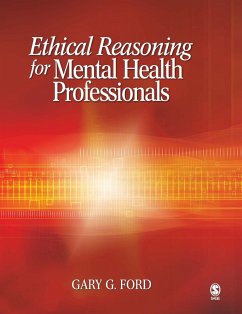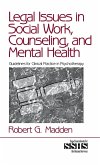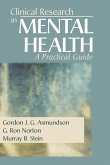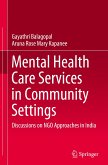Gary G. Ford
Ethical Reasoning for Mental Health Professionals
Gary G. Ford
Ethical Reasoning for Mental Health Professionals
- Gebundenes Buch
- Merkliste
- Auf die Merkliste
- Bewerten Bewerten
- Teilen
- Produkt teilen
- Produkterinnerung
- Produkterinnerung
Ethical Reasoning for Mental Health Professionals addresses a fundamental need of ethics training in psychology and counseling: the development of reasoning skills to resolve the complex professional ethical issues that arise. Author Gary G. Ford provides readers with a background in ethical reasoning and introduces them to an easy-to-follow eight step model of ethical decision making.
Andere Kunden interessierten sich auch für
![Skills for Helping Professionals Skills for Helping Professionals]() Anne M. GeroskiSkills for Helping Professionals121,99 €
Anne M. GeroskiSkills for Helping Professionals121,99 €![Public Policy and Mental Health Public Policy and Mental Health]() Maureen A. PirogPublic Policy and Mental Health40,99 €
Maureen A. PirogPublic Policy and Mental Health40,99 €![Legal Issues in Social Work, Counseling, and Mental Health Legal Issues in Social Work, Counseling, and Mental Health]() Robert G. MaddenLegal Issues in Social Work, Counseling, and Mental Health199,99 €
Robert G. MaddenLegal Issues in Social Work, Counseling, and Mental Health199,99 €![Clinical Research in Mental Health Clinical Research in Mental Health]() Gordon J G AsmundsonClinical Research in Mental Health140,99 €
Gordon J G AsmundsonClinical Research in Mental Health140,99 €![Social Work Issues Social Work Issues]() Francis Borboh DumbuyaSocial Work Issues18,99 €
Francis Borboh DumbuyaSocial Work Issues18,99 €![Mental Health Care Services in Community Settings Mental Health Care Services in Community Settings]() Gayathri BalagopalMental Health Care Services in Community Settings37,99 €
Gayathri BalagopalMental Health Care Services in Community Settings37,99 €![Telehealth for Professionals Telehealth for Professionals]() Maryellen Evers Lcsw CaadcTelehealth for Professionals10,99 €
Maryellen Evers Lcsw CaadcTelehealth for Professionals10,99 €-
-
-
Ethical Reasoning for Mental Health Professionals addresses a fundamental need of ethics training in psychology and counseling: the development of reasoning skills to resolve the complex professional ethical issues that arise. Author Gary G. Ford provides readers with a background in ethical reasoning and introduces them to an easy-to-follow eight step model of ethical decision making.
Produktdetails
- Produktdetails
- Verlag: Sage Publications, Inc
- Seitenzahl: 408
- Erscheinungstermin: 13. Januar 2006
- Englisch
- Abmessung: 241mm x 196mm x 26mm
- Gewicht: 954g
- ISBN-13: 9780761930938
- ISBN-10: 0761930930
- Artikelnr.: 21812396
- Verlag: Sage Publications, Inc
- Seitenzahl: 408
- Erscheinungstermin: 13. Januar 2006
- Englisch
- Abmessung: 241mm x 196mm x 26mm
- Gewicht: 954g
- ISBN-13: 9780761930938
- ISBN-10: 0761930930
- Artikelnr.: 21812396
Gary G. Ford, Ph.D., is a professor in the Department of Psychology at Stephen F. Austin State University. He teaches both undergraduate and graduate courses, such as professional ethics, theories of personality, personality assessment, history and systems of psychology, human consciousness, existential psychology, and psychopathology. He is also actively involved in providing practicum supervision in the clinical psychology graduate program. Among the areas he has published in previously are professional ethics, substance abuse, psychological defense, existential psychology, and sports psychology. He served on the Editorial Board of Journal of Research in Personality for six years. Dr. Ford received his Ph.D. in clinical psychology from Fordham University, Bronx, New York, and his M.A. in philosophy from the University of Illinois at Urbana-Champaign. His interdisciplinary academic background in philosophy and psychology has provided him with a unique perspective on the complex task of developing an ethics book for mental health professionals that will enable them to reason effectively when confronted with the ethical conflicts that invariably arise in their professional practice. He has been a licensed clinical psychologist for nearly 20 years and has been affiliated with Veterans Administration Medical Centers and worked in private practice. He has served on IRBs and ethics committees in both hospital and university settings. He has administered psychology licensing examinations as an Oral Examiner for the Texas State Board of Examiners of Psychologists and conducted continuing education workshops in professional ethics.
Preface Ch 1. Introduction What is Ethics Ethics and Personal Values The Role and Values in the Practice of a Mental Health Profession Why do Professions Develop Ethical Standards? The History of Ethics in Psychology "Ethical Principals of Psychologists and Code of Conduct" Counseling: Code of Ethics Psychiatry: The Principles of Medical Ethics, With Annotations Especially Applicable to Psychiatry Social Work: Code of Ethics of the National Association of Social Workers The Limitations of Ethical Codes Ethics and Law Summary Ch 2. "Ethical Principles of Psychologists and Code of Conduct" Introduction and Applicability Preamble General Principles Summary Ch 3. Counseling
s Code of Ethics Preamble ACA Code of Ethics Sections The Existence of Ethical Conflict Summary Ch 4. Models of Ethical Reasoning and Their Effectiveness in Resolving Ethical Conflict The Philosophical Basis of Ethical Judgments Utilitarianism Kant
s Formalist Ethical Theory The Need for Ethical Problem-Solving Skills to Address Conflicts Between Ethical Principles Ethical Relativism Ethical Contextualism Summary Ch 5: A Model of the Ethical Decision-Making Process The Purpose of the Model The Model A Case Example Applying the Model of Ethical Decision Making Summary Ch 6: Ethical Issues in Psychotherapy and Counseling Informed Consent Confidentiality Multiple Relationships Conflict of Interest Competence Respect for Clients
Autonomy Termination Practice Case Involving the Model of Ethical Decision Making Summary Ch 7: Organizational Settings and Special Populations Working Within an Organization Conflict of Interest Working in a Psychiatric Hospital Managed Care Practice Working in Forensic (Correctional) Settings Mental Health Professionals in the Military Psychotherapy With Children School Psychology and Counseling Practice Case Involving the Model of Ethical Decision Making Summary Ch 8: Ethical Issues in Assessment and Testing The Value and Ethical Implications of Psychiatric Diagnoses Psychological and Educational Assessment and Testing Multicultural Issues in Psychological Assessment Ethics and Test Validity Use of Computerized Test Administration, Scoring, and Interpretation Report Writing Special Considerations in College Orientation Testing Practice Case Involving the Model of Ethical Decision Making Summary Ch 9: The Use of Computer Technology in Professional Practice Specialty Guidelines for E-Therapy Beneficence Nonmaleficence Integrity Competence Informed consent Confidentiality Conducting Assessments Using the Internet Conclusion Practice Case Involving the Model of Ethical Decision Making Summary Ch 10: Practice and Assessment in Organizational and Business Settings Working for a Business Organization Competence Consulting Relationships Special Considerations in Industrial/Organizational Assessment Entrepreneurial Practice of a Mental Health Profession Practice Case Involving the Model of Ethical Decision Making Summary CH 11: Ethical Issues in Teaching and Supervision Competence Informed Consent Multiple Relationships Confidentiality Professional and Scientific Responsibility Teaching Students About Values and Professional Ethics Ethical and Legal Issues in Supervision Practice Case Involving the Model of Ethical Decision Making Summary Ch 12: Ethical Issues in Research Ethics, Values, and Theory Construction Conducting Research With Human Participants Protecting Research Participants From Harm Informed Consent Special Considerations in Conducting Research With Children The Use of Deception in Research Confidentiality Ethical Issues Concerning the Use of Student Subject Pools Ethics and Scientific Merit of Research Ethical Issues in Data Collection and Analysis Ethical Issues in Publishing Research Results Ethical Issues in Conducting Research on the Internet Ethical Issues in Conducting Animal Research Practice Case Involving the Model of Ethical Decision Making Summary Ch 13: Mental Health Professions and the Law Legal Issues in Hospital Admission for Psychiatric Treatment Involuntary Hospitalizations: The Psychiatric Commitment Process The Rights of Psychiatric Inpatient Clients Ethical Considerations in Suicide Preventions Forensic Practice in the Mental Health Professions What if Ethics and the Law Conflict? Practice Case Involving the Model of Ethical Decision Making Summary Ch 14: State Boards, Ethics Committees, and Ethics Complaints When Professionals Identify Unethical Conduct State Boards of Psychology and Counseling Professional Organizations
Ethics Committees Dealing Appropriately With a State Board of Ethics Committee Inquiry Legal Complaints Against Mental Health Professionals Avoiding Difficulties by Functioning as an Ethical Professional Practice Case Involving the Model of Ethical Decision Makings Summary References Appendices A: "Ethical Principles of Psychologists and Code of Conduct" B: ACA Code of Ethics
s Code of Ethics Preamble ACA Code of Ethics Sections The Existence of Ethical Conflict Summary Ch 4. Models of Ethical Reasoning and Their Effectiveness in Resolving Ethical Conflict The Philosophical Basis of Ethical Judgments Utilitarianism Kant
s Formalist Ethical Theory The Need for Ethical Problem-Solving Skills to Address Conflicts Between Ethical Principles Ethical Relativism Ethical Contextualism Summary Ch 5: A Model of the Ethical Decision-Making Process The Purpose of the Model The Model A Case Example Applying the Model of Ethical Decision Making Summary Ch 6: Ethical Issues in Psychotherapy and Counseling Informed Consent Confidentiality Multiple Relationships Conflict of Interest Competence Respect for Clients
Autonomy Termination Practice Case Involving the Model of Ethical Decision Making Summary Ch 7: Organizational Settings and Special Populations Working Within an Organization Conflict of Interest Working in a Psychiatric Hospital Managed Care Practice Working in Forensic (Correctional) Settings Mental Health Professionals in the Military Psychotherapy With Children School Psychology and Counseling Practice Case Involving the Model of Ethical Decision Making Summary Ch 8: Ethical Issues in Assessment and Testing The Value and Ethical Implications of Psychiatric Diagnoses Psychological and Educational Assessment and Testing Multicultural Issues in Psychological Assessment Ethics and Test Validity Use of Computerized Test Administration, Scoring, and Interpretation Report Writing Special Considerations in College Orientation Testing Practice Case Involving the Model of Ethical Decision Making Summary Ch 9: The Use of Computer Technology in Professional Practice Specialty Guidelines for E-Therapy Beneficence Nonmaleficence Integrity Competence Informed consent Confidentiality Conducting Assessments Using the Internet Conclusion Practice Case Involving the Model of Ethical Decision Making Summary Ch 10: Practice and Assessment in Organizational and Business Settings Working for a Business Organization Competence Consulting Relationships Special Considerations in Industrial/Organizational Assessment Entrepreneurial Practice of a Mental Health Profession Practice Case Involving the Model of Ethical Decision Making Summary CH 11: Ethical Issues in Teaching and Supervision Competence Informed Consent Multiple Relationships Confidentiality Professional and Scientific Responsibility Teaching Students About Values and Professional Ethics Ethical and Legal Issues in Supervision Practice Case Involving the Model of Ethical Decision Making Summary Ch 12: Ethical Issues in Research Ethics, Values, and Theory Construction Conducting Research With Human Participants Protecting Research Participants From Harm Informed Consent Special Considerations in Conducting Research With Children The Use of Deception in Research Confidentiality Ethical Issues Concerning the Use of Student Subject Pools Ethics and Scientific Merit of Research Ethical Issues in Data Collection and Analysis Ethical Issues in Publishing Research Results Ethical Issues in Conducting Research on the Internet Ethical Issues in Conducting Animal Research Practice Case Involving the Model of Ethical Decision Making Summary Ch 13: Mental Health Professions and the Law Legal Issues in Hospital Admission for Psychiatric Treatment Involuntary Hospitalizations: The Psychiatric Commitment Process The Rights of Psychiatric Inpatient Clients Ethical Considerations in Suicide Preventions Forensic Practice in the Mental Health Professions What if Ethics and the Law Conflict? Practice Case Involving the Model of Ethical Decision Making Summary Ch 14: State Boards, Ethics Committees, and Ethics Complaints When Professionals Identify Unethical Conduct State Boards of Psychology and Counseling Professional Organizations
Ethics Committees Dealing Appropriately With a State Board of Ethics Committee Inquiry Legal Complaints Against Mental Health Professionals Avoiding Difficulties by Functioning as an Ethical Professional Practice Case Involving the Model of Ethical Decision Makings Summary References Appendices A: "Ethical Principles of Psychologists and Code of Conduct" B: ACA Code of Ethics
Preface Ch 1. Introduction What is Ethics Ethics and Personal Values The Role and Values in the Practice of a Mental Health Profession Why do Professions Develop Ethical Standards? The History of Ethics in Psychology "Ethical Principals of Psychologists and Code of Conduct" Counseling: Code of Ethics Psychiatry: The Principles of Medical Ethics, With Annotations Especially Applicable to Psychiatry Social Work: Code of Ethics of the National Association of Social Workers The Limitations of Ethical Codes Ethics and Law Summary Ch 2. "Ethical Principles of Psychologists and Code of Conduct" Introduction and Applicability Preamble General Principles Summary Ch 3. Counseling
s Code of Ethics Preamble ACA Code of Ethics Sections The Existence of Ethical Conflict Summary Ch 4. Models of Ethical Reasoning and Their Effectiveness in Resolving Ethical Conflict The Philosophical Basis of Ethical Judgments Utilitarianism Kant
s Formalist Ethical Theory The Need for Ethical Problem-Solving Skills to Address Conflicts Between Ethical Principles Ethical Relativism Ethical Contextualism Summary Ch 5: A Model of the Ethical Decision-Making Process The Purpose of the Model The Model A Case Example Applying the Model of Ethical Decision Making Summary Ch 6: Ethical Issues in Psychotherapy and Counseling Informed Consent Confidentiality Multiple Relationships Conflict of Interest Competence Respect for Clients
Autonomy Termination Practice Case Involving the Model of Ethical Decision Making Summary Ch 7: Organizational Settings and Special Populations Working Within an Organization Conflict of Interest Working in a Psychiatric Hospital Managed Care Practice Working in Forensic (Correctional) Settings Mental Health Professionals in the Military Psychotherapy With Children School Psychology and Counseling Practice Case Involving the Model of Ethical Decision Making Summary Ch 8: Ethical Issues in Assessment and Testing The Value and Ethical Implications of Psychiatric Diagnoses Psychological and Educational Assessment and Testing Multicultural Issues in Psychological Assessment Ethics and Test Validity Use of Computerized Test Administration, Scoring, and Interpretation Report Writing Special Considerations in College Orientation Testing Practice Case Involving the Model of Ethical Decision Making Summary Ch 9: The Use of Computer Technology in Professional Practice Specialty Guidelines for E-Therapy Beneficence Nonmaleficence Integrity Competence Informed consent Confidentiality Conducting Assessments Using the Internet Conclusion Practice Case Involving the Model of Ethical Decision Making Summary Ch 10: Practice and Assessment in Organizational and Business Settings Working for a Business Organization Competence Consulting Relationships Special Considerations in Industrial/Organizational Assessment Entrepreneurial Practice of a Mental Health Profession Practice Case Involving the Model of Ethical Decision Making Summary CH 11: Ethical Issues in Teaching and Supervision Competence Informed Consent Multiple Relationships Confidentiality Professional and Scientific Responsibility Teaching Students About Values and Professional Ethics Ethical and Legal Issues in Supervision Practice Case Involving the Model of Ethical Decision Making Summary Ch 12: Ethical Issues in Research Ethics, Values, and Theory Construction Conducting Research With Human Participants Protecting Research Participants From Harm Informed Consent Special Considerations in Conducting Research With Children The Use of Deception in Research Confidentiality Ethical Issues Concerning the Use of Student Subject Pools Ethics and Scientific Merit of Research Ethical Issues in Data Collection and Analysis Ethical Issues in Publishing Research Results Ethical Issues in Conducting Research on the Internet Ethical Issues in Conducting Animal Research Practice Case Involving the Model of Ethical Decision Making Summary Ch 13: Mental Health Professions and the Law Legal Issues in Hospital Admission for Psychiatric Treatment Involuntary Hospitalizations: The Psychiatric Commitment Process The Rights of Psychiatric Inpatient Clients Ethical Considerations in Suicide Preventions Forensic Practice in the Mental Health Professions What if Ethics and the Law Conflict? Practice Case Involving the Model of Ethical Decision Making Summary Ch 14: State Boards, Ethics Committees, and Ethics Complaints When Professionals Identify Unethical Conduct State Boards of Psychology and Counseling Professional Organizations
Ethics Committees Dealing Appropriately With a State Board of Ethics Committee Inquiry Legal Complaints Against Mental Health Professionals Avoiding Difficulties by Functioning as an Ethical Professional Practice Case Involving the Model of Ethical Decision Makings Summary References Appendices A: "Ethical Principles of Psychologists and Code of Conduct" B: ACA Code of Ethics
s Code of Ethics Preamble ACA Code of Ethics Sections The Existence of Ethical Conflict Summary Ch 4. Models of Ethical Reasoning and Their Effectiveness in Resolving Ethical Conflict The Philosophical Basis of Ethical Judgments Utilitarianism Kant
s Formalist Ethical Theory The Need for Ethical Problem-Solving Skills to Address Conflicts Between Ethical Principles Ethical Relativism Ethical Contextualism Summary Ch 5: A Model of the Ethical Decision-Making Process The Purpose of the Model The Model A Case Example Applying the Model of Ethical Decision Making Summary Ch 6: Ethical Issues in Psychotherapy and Counseling Informed Consent Confidentiality Multiple Relationships Conflict of Interest Competence Respect for Clients
Autonomy Termination Practice Case Involving the Model of Ethical Decision Making Summary Ch 7: Organizational Settings and Special Populations Working Within an Organization Conflict of Interest Working in a Psychiatric Hospital Managed Care Practice Working in Forensic (Correctional) Settings Mental Health Professionals in the Military Psychotherapy With Children School Psychology and Counseling Practice Case Involving the Model of Ethical Decision Making Summary Ch 8: Ethical Issues in Assessment and Testing The Value and Ethical Implications of Psychiatric Diagnoses Psychological and Educational Assessment and Testing Multicultural Issues in Psychological Assessment Ethics and Test Validity Use of Computerized Test Administration, Scoring, and Interpretation Report Writing Special Considerations in College Orientation Testing Practice Case Involving the Model of Ethical Decision Making Summary Ch 9: The Use of Computer Technology in Professional Practice Specialty Guidelines for E-Therapy Beneficence Nonmaleficence Integrity Competence Informed consent Confidentiality Conducting Assessments Using the Internet Conclusion Practice Case Involving the Model of Ethical Decision Making Summary Ch 10: Practice and Assessment in Organizational and Business Settings Working for a Business Organization Competence Consulting Relationships Special Considerations in Industrial/Organizational Assessment Entrepreneurial Practice of a Mental Health Profession Practice Case Involving the Model of Ethical Decision Making Summary CH 11: Ethical Issues in Teaching and Supervision Competence Informed Consent Multiple Relationships Confidentiality Professional and Scientific Responsibility Teaching Students About Values and Professional Ethics Ethical and Legal Issues in Supervision Practice Case Involving the Model of Ethical Decision Making Summary Ch 12: Ethical Issues in Research Ethics, Values, and Theory Construction Conducting Research With Human Participants Protecting Research Participants From Harm Informed Consent Special Considerations in Conducting Research With Children The Use of Deception in Research Confidentiality Ethical Issues Concerning the Use of Student Subject Pools Ethics and Scientific Merit of Research Ethical Issues in Data Collection and Analysis Ethical Issues in Publishing Research Results Ethical Issues in Conducting Research on the Internet Ethical Issues in Conducting Animal Research Practice Case Involving the Model of Ethical Decision Making Summary Ch 13: Mental Health Professions and the Law Legal Issues in Hospital Admission for Psychiatric Treatment Involuntary Hospitalizations: The Psychiatric Commitment Process The Rights of Psychiatric Inpatient Clients Ethical Considerations in Suicide Preventions Forensic Practice in the Mental Health Professions What if Ethics and the Law Conflict? Practice Case Involving the Model of Ethical Decision Making Summary Ch 14: State Boards, Ethics Committees, and Ethics Complaints When Professionals Identify Unethical Conduct State Boards of Psychology and Counseling Professional Organizations
Ethics Committees Dealing Appropriately With a State Board of Ethics Committee Inquiry Legal Complaints Against Mental Health Professionals Avoiding Difficulties by Functioning as an Ethical Professional Practice Case Involving the Model of Ethical Decision Makings Summary References Appendices A: "Ethical Principles of Psychologists and Code of Conduct" B: ACA Code of Ethics








